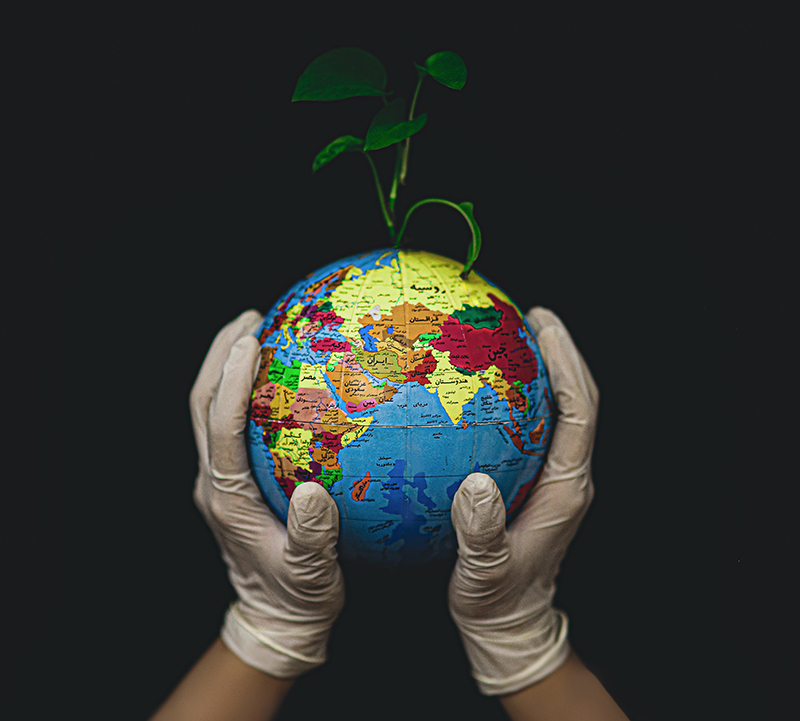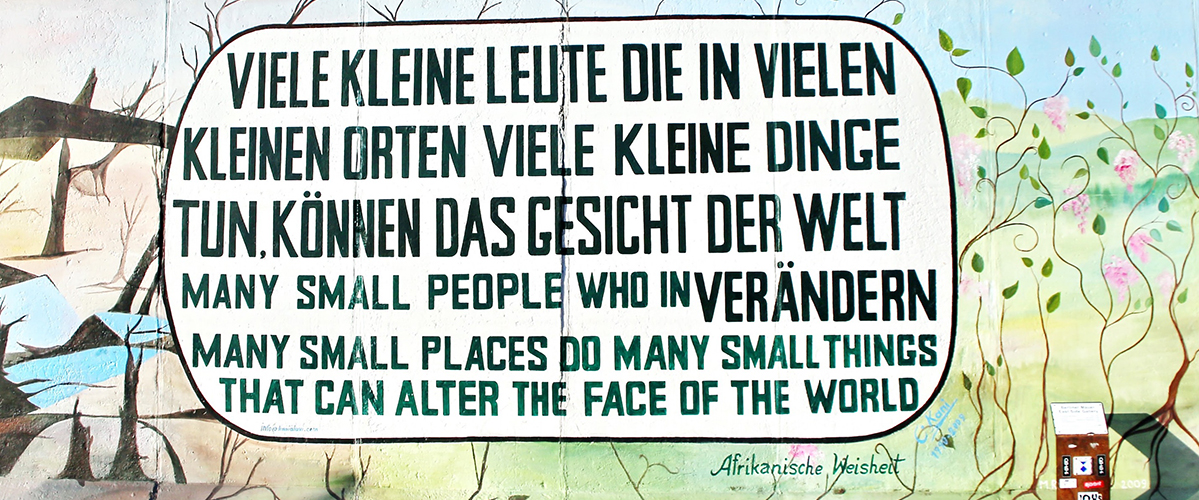We at Nurses Drawdown are ready to make real change in our everyday lives, our communities, and our Earth. Join us in building a healthier and more sustainable future together by taking action now. Explore the action items below to learn how you can start making a difference with us today.
There is hope and courage when we work together for a better future for all!

How you can take action
Click on each area of action below to read about ways you can become a part of the solution to climate change. We have tried to include a wide variety of actions that any nurse, from a nurse who is just discovering about climate change and health to nurses who have been working to address climate change for years, can find useful and inspiring. We hope you will commit to starting one solution today. Imagine what will happen if all 28 million nurses around the globe commit to being a part of climate solutions – it will be amazing!
While an energy revolution is a complicated process that will take years, if not decades to complete, there are still every day actions that we can take as individuals to reduce our carbon footprints by breaking our reliance on fossil fuels. Here are some ways that you can make an impact in your everyday life:
-
- Use alternative energy sources like solar power
- In the U.S. ,low to moderate income single families in California, Colorado, Delaware, District of Columbia, Maryland, and Virginia may be eligible for free solar power panels and their installation through GRID Alternatives
- The following international nonprofits provide solar power in developing nations:
- GivePower: provides solar power to areas in need across 17 countries to power schools, water treatments, hospitals and more
- Let There Be Light International: provides solar power to homes and health clinics in off-grid areas of Uganda, Malawi, and Kenya
- GRID Alternatives International Program: provides solar power to homes, health centers, small businesses, orphanages and schools, and community water projects in communities in Nepal, Nicaragua, and Mexico
- We Care Solar: provides “solar suitcases” to clinics and healthcare workers to promote maternal and infant health in dozens of countries such as Peru, Afghanistan, Mozambique, among so many more
- Practice energy conservation at home
- Utilize sunlight and turn off lights when leaving rooms
- Switch to a smart thermostat that keeps your home comfortable with energy efficiency, such as Nest, ecobee Smart Thermostat, and the Honeywell T5+ Smart Thermostat
- Take public transportation and carpool instead of driving
- Switch to energy efficient light bulbs
- Install low-flow plumbing fixtures that use significantly less water more efficiently
- Check out the EPA’s WaterSense labeled products (appliances that meet EPA standards for water efficiency and performance). Click here browse environmentally friendly plumbing fixtures.
- Calculate your carbon footprint to learn more about how you can best reduce your use of fossil fuel energy
- Become a “reducetarian” by cooking organic plant-based meals a few times per week. The meat and dairy industry requires a lot of fossil fuel energy for processing, packaging, transport, and chemical fertilizer production. Cooking organic plant-based meals, especially with fresh local produce, reduces reliance on fossil fuel consuming meat and dairy products–all while being delicious and healthy!
- Advocate! One of the most important things you can do is to advocate–whether it be on a personal, community, or even global scale–for cleaner energy and divestment. Nurses are leaders and can use their voices to advocate for a cleaner future.
- Use alternative energy sources like solar power
Check out this list of action items that individuals and organizations can use as inspiration for achieving gender equity and in turn reducing carbon emissions:
-
- Provide menstrual products to women and girls in developing nations. Girls without access to feminine hygiene products and bathrooms with running water at school can miss up to 20% of their education. One of the most valuable, if not the most valuable, tools in achieving gender equity is through education. Sustainable and reusable menstrual products provide long-term solutions for feminine care while also reducing plastic waste from tampon and sanitary pads to keep girls healthy and in school, while also helping the planet. You can take action right now by donating to the following organizations that are paving the way for gender equity and sustainability by providing girls with reusable menstrual products to keep girls in school and reduce waste:
- Lunapads and Pads4Girls: Lunapads is a sustainable menstrual product company that sells organic and reusable cloth pads (Lunapads), period underwear, and menstrual cups. Their Pads4Girls program funded by individuals, groups, and NGOs supplies Lunapads to women and girls in the Global South so that they can stay healthy and be able to go to school while menstruating.
- AFRIpads is the leading manufacturer and commercial supplier of reusable sanitary pads in Africa. The program recognizes access to menstrual products as a vehicle for female empowerment, education, and reproductive health. The company also employs over 200 Ugandan women to make the pads and is currently working to expand and create new jobs for African women.
- Click here to donate menstrual kits to ensure a girl’s school attendance for a full year
- Build Africa: One of this African education charity’s initiatives is to provide clean water and toilets in schools. While this is to help all children, the charity stresses the importance of access to clean, private restrooms on keeping girls in school, especially when they are menstruating. Build Africa also supplies menstrual kits including reusable cloth pads, underwear, and hygienic soap to girls to help keep them in school year-round.
- Provide access to contraceptives. Family planning options are nearly non-existent without education and access to contraceptives. According to the United Nations (UN), 9 out of 10 contraceptive users rely on modern methods such as oral contraceptives, contraceptive implants, intrauterine devices (IUDs), etc. leaving countless women to rely on less effective methods of contraception such as “pulling out” and timed intercourse. Nurse interventions with family planning education as well as organizations providing access to a variety of contraceptives can make a long-lasting impact on the lives of girls in developing nations.
- Check out the UN’s Family Planning and the 2030 Agenda for Sustainable Development for current projections, needs, and actions for providing access to contraceptives globally
- Pathfinder International has a Contraception and Family Planning Initiative that partners with local decision-makers and supports clinics to ensure access to contraceptives in developing nations
- Click here to start your own Pathfinders fundraiser as an individual, group, or organization!
- Involve men in family planning. Contraception for too long has been a responsibility placed mostly, if not solely, on women. Men should be a part of the conversation around family planning and the responsibility of ensuring safer sex should be shared between sexual partners equally. Given the long-standing effectiveness of nurse-led sexual education, nurses can help engage men in family planning. The following resources are guides for planning male engagement in family planning globally:
- Involve trusted faith-based organizations and religious leaders. Faith and secularism are often assumed to be at odds when it comes to practicing safer sex and family planning. However, organizations like Pathfinders International and Jhpiego have come to appreciate the influence that trusted religious leaders and organizations have on introducing family planning methods to their communities in developing nations. Nurse partnerships with such leaders can help provide a safe space for community members to learn about family planning from both a healthcare provider and a community leader.
- Check out Georgetown University’s 2011 report Faith-Based Organizations as Partners in Family Planning: Working Together to Improve Family Well-being that details the advantages of involving Christian and Muslim community leaders in educating about voluntary family planning and how to overcome barriers to success of this approach
- Read about how to modernize approaches to uptake of family planning methods by involving trusted faith-based organizations and religious leaders in Nigeria by a Johns Hopkins study here
- Provide menstrual products to women and girls in developing nations. Girls without access to feminine hygiene products and bathrooms with running water at school can miss up to 20% of their education. One of the most valuable, if not the most valuable, tools in achieving gender equity is through education. Sustainable and reusable menstrual products provide long-term solutions for feminine care while also reducing plastic waste from tampon and sanitary pads to keep girls healthy and in school, while also helping the planet. You can take action right now by donating to the following organizations that are paving the way for gender equity and sustainability by providing girls with reusable menstrual products to keep girls in school and reduce waste:
Our goal is to move towards plant-based or “reducetarian” diets and to reduce food waste to keep our bodies and environment healthy. Here are some ways you can accomplish this goal:
- Plant-based diet actions:
- Practice and inspire the use of plant-forward food sources in their everyday lives and communities. The following programs demonstrate initiatives that strive to reduce carbon emissions by eating more sustainable and plant-forward foods:
- Meatless Monday: Meatless Monday is a global organization that aims to reduce meat consumption by 15% by eating vegetarian once a week. The organization’s website provides tools for starting your own Meatless Monday in school, work, hospitals, communities, etc. as well as free access to recipes and eCookbooks to make enjoying delicious meatless meals that much easier.
- Good Food on a Tight Budget: One of the Environmental Working Group’s programs, Good Food on a Tight Budget helps individuals and families eat healthy and sustainably on any budget. Often times the most affordable food options are the most processed and least nutritious. Nurses can utilize the list of foods with the most nutrition for the lowest cost as well as the free recipes to help inform low-income families on how to eat well for their own health and the environment’s.
- Global Green and Healthy Hospitals: Hospitals around the globe are looking at how they can be more sustainable through their food purchasing practices. These activities include purchasing less meat, buying from local farmers, and holding farmers markets at their facilities. Read case studies from around the world on ways hospitals are are addressing sustainability through food.
- Educate your families, communities, fellow nurses (and other health professionals) and policy-makers about the benefits of plant-based diets
- Start a farmers’ markets at your hospital. Here are examples of farmers’ markets that have been implemented
- The Food Trust’s guide to How Food Access Nonprofits and Hospitals Can Work Together to Promote Wellness
- Check out this example: NYC Health + Hospitals to Host Farmers Market to Help Expand Access to Affordable, Healthy Food Options for Patients and Staff
- Create and promote opportunities in your local community for residents to access locally grown foods through activities such as Farmers’ Markets and community supported agriculture programs
- Advocate for changes to dietary guidelines that incorporate more plant-based options. See how Canada’s Food Guide integrates non-animal based protein options.
- Practice and inspire the use of plant-forward food sources in their everyday lives and communities. The following programs demonstrate initiatives that strive to reduce carbon emissions by eating more sustainable and plant-forward foods:
- Reducing food waste action items:
- Reduce food waste in your home by buying less and composting food scraps
- Learn how to compost at home using this guide
- Freeze, preserve, or can surplus fruits and vegetables – especially abundant seasonal produce
- Use The Food: Too Good to Waste Toolkit to help you figure out how much food is really going to waste in your home and what you can do to waste less. By making small shifts in how you shop for, prepare, and store food, you can save time and money, and keep the valuable resources used to produce and distribute food from going to waste.
- Nutritious, safe, and untouched food can be donated to food banks to help those in need.
- Reduce food waste in your community
- Support community-wide composting systems, including curbside collections
- Too Good to Waste also contains an Implementation Guide that is designed to teach local governments and community organizations how to implement a Food: Too Good to Waste campaign in their community using the Toolkit.
- Create and advocate for redistribution of excess food from stores, conferences, and other big events
- Green Event Guide: A Guide to Reducing Waste at Meetings, Conferences and Events was developed to help event planners reduce waste through source reduction, recycling, and composting
- Advocate for locally sourced foods and programs that support local food production, such as Farmers’ Markets and Community Supported Agriculture (CSA).
- Reduce food waste in your home by buying less and composting food scraps
- Promote clean cooking action items:
- Learn more about various aspects of the clean cooking sector at the Clean Cooking Alliance’s website here.
- Educate patients and communities about clean cooking options.
- Support research and the development of cleaner sustainable technologies in academic centers and institutions and through advocacy with elected officials and government leaders.
- Advocate for the inclusion of clean cooking into Sustainable Development Goals and climate change planning discussions and implementation.
Most of us leave our homes every single day and the consequences of our mobility choices each time we do have an impact on our communities and our environment. Check out these sample actions that be taken to utilize active and mass transport at the individual and organizational levels as well as in patient care interactions.
- Individual actions:
- Individually practice active transport or utilizing public transportation
- Live close to where you work and play if possible
- Infrastructure comes first! Advocate at the legislative level for safe bikeable and walkable routes, as well as mass transit
- Organizational change in the workplace:
- Advocate for infrastructure to support active and mass transit to and from the workplace
- This can be in the form of bike storage, showers, carpool options, safe bus stops, etc. Then use it!
- Develop incentives to support active and mass transit to and from the workplace.
- This can be through reimbursement for transit and other types of rewards programs. Then use them!
- Advocate for infrastructure to support active and mass transit to and from the workplace
- Patient care:
- Perform environmental assessment of access to means of active and mass transit
- Incorporate practicality and planetary benefit into patient education about activity related to diagnosis. Use the time that you have with your patients to encourage behavior that will benefit their health as well as their community’s.
- For example, walking to work is both physically healthy and beneficial to the climate and is an affordable alternative to going to the gym.
Protecting our earth means protecting that natural space that we inhabit. The following steps can be taken to preserve our planet while also providing cleaner air to improve community health.
- Individual actions:
- Eat a plant-based diet. One of the leading causes of tropical deforestation especially in the Amazon is clearing and burning to create land for cattle
- Offset any air travel with contributions to reputable organizations that plant trees. Any example of a quality carbon offset organization is Gold Standard.
- Plant trees in your own yards or neighborhood. There are tree planting organizations ALL OVER THE WORLD. Google your area (city, state, country) and tree planting and see what you can find. Let us know!!
- Think before your print!
- Health care organizations:
- Work with hospital and clinic ground teams to develop and plant more indigenous trees on the property
- Limit use of paper products and when paper is necessary make sure that products are from responsibly managed forests, for example certified by the Forest Stewardship Council
- Recycle paper and use compostable products as much as possible
- Patients and communities:
- Encourage patients and families to plant more trees on their private properties
- Teach people the connection between healthy forests and human health including heat reduction, clean air, and enhanced well-being
- Promote use of clean cook stoves that do not require food for fuel
- Learn more about clean cook stoves here
- Conserving existing forests
- It is estimated that we have lost 40% of global forests since the pre-industrial era. This corresponds to an equal amount of habitat loss and even extinction of species. These statistics were derived from One Tree Planted, one of many organizations that nurses can support, which help to plant trees and conserve existing forests.
-
Global Forest Watch has created a set of interactive maps where you can explore the world’s forests, as well as get deforestation alerts.
Are you already taking action and would like to share? We’d love for you to submit a smartphone video that we can share on the website and social media. You can find a how-to guide to shooting your video here. Upload you video here.
We are also putting together a recipe book of nurses’ favorite plant-based dishes. You can share you recipes here.

